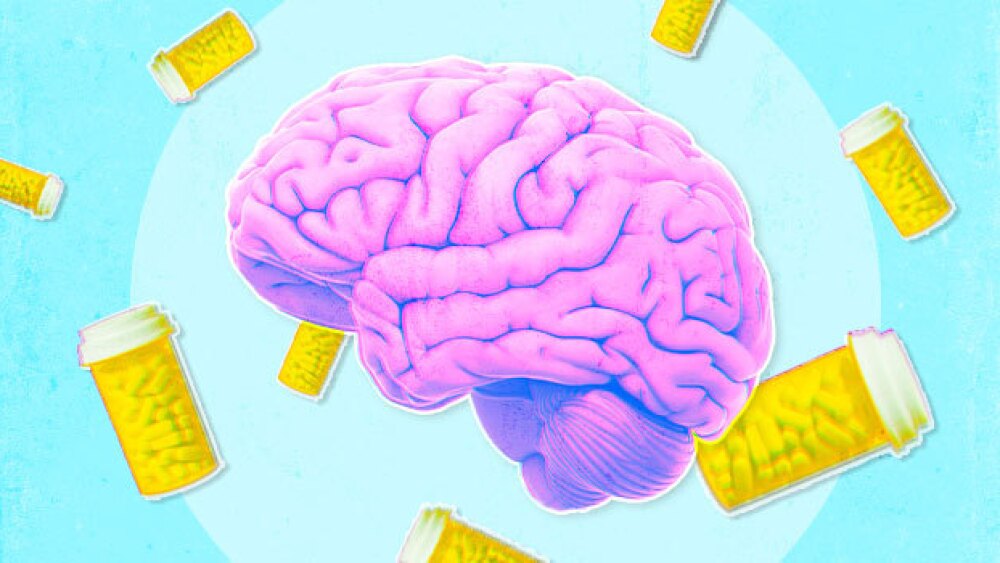Recipients of the $100,000, one-year grants are seeking new potential targets for understanding and treating a wide range of neuropsychiatric disorders that affect one in five people, including depression, PTSD, eating disorders, schizophrenia, and psychosis.
|
|
| [13-December-2017] |
|
NEW YORK, Dec. 13, 2017 /PRNewswire-USNewswire/ -- The Brain & Behavior Research Foundation today announced the awarding of its Distinguished Investigator Grants valued at $1.7 million to 17 scientists, who are full professors or the equivalent, conducting innovative projects in diverse areas of neurobiological and behavioral research. Recipients of the $100,000, one-year grants are seeking new potential targets for understanding and treating a wide range of neuropsychiatric disorders that affect one in five people, including depression, post-traumatic stress disorder (PTSD), eating disorders, schizophrenia, and psychosis. Recipients of the 2017 Distinguished Investigator Grants were selected by the Foundation's Scientific Council, which is composed of 176 leading experts across disciplines in brain and behavior research, including two Nobel Laureates; two former directors of the National Institute of Mental Health, as well as the current director; four recipients of the National Medal of Science; 13 members of the National Academy of Sciences, 26 chairs of psychiatric departments, and 52 members of the National Academy of Medicine. "By funding creative research that explores new ways to prevent, diagnose and treat psychiatric disorders, the Distinguished Investigator Grants support and encourage established scientists to advance our understanding about mental illness, and brain and behavior disorders," says Foundation President and CEO Jeffrey Borenstein, M.D. "These grants serve as seed capital for new approaches that might otherwise go unfunded." "As funds for research from the National Institutes of Health have declined by 20 percent over the past decade, the Foundation's Distinguished Investigator program has become extraordinarily important for the field and its potential to help severe mental illness," said Jack D. Barchas, M.D., Chair and Barklie McKee Henry Professor of Psychiatry at Weill Cornell Medical College, and Psychiatrist-in-Chief at Weill Cornell Medical College, NewYork-Presbyterian Hospital and Paine Whitney Clinic, who chairs the Scientific Council's Distinguished Investigator selection committee. "This year's Distinguished Investigators use a remarkable range of methodologies to sharpen current treatments and define potential new targets, including previously unstudied or understudied neuroregulators, interactions and circuits, using newer and more precise methods and improved psychosocial approaches. We were impressed by the variety of new approaches, which could prove helpful or even transformative, and will be supported by this seed capital," he added. "These include studies focusing on the immune system; looking at pre-birth events and stressors of all types; and examining large important databases for new clues." The Recipients of the 2017 Distinguished Investigator Grants are as follows: Elisabeth B. Binder, M.D., Ph.D., of the Max-Planck Institute of Psychiatry, has focused her research on the molecular genetics of depression. Her proposal, Dissecting Epigenetic Consequences of Prenatal Adversity Using Human Brain Organoids, will look at prenatal adversity and how such adversity alters chemical tags on DNA called epigenetic marks, which in turn regulate the activity of genes. J. Douglas Bremner, M.D., Emory University, uses neuroimaging and neurobiology measures to study the neural correlates and neurobiology of PTSD related to combat and childhood abuse, as well as the related area of depression. His proposal, Mechanisms of Electrical Treatment for Post-Traumatic Stress Disorder, uses noninvasive Vasal Nerve Stimulation (VNS) devices to treat PTSD. This new approach has received increasing attention, and, if successful in PTSD, could have a significant clinical impact, potentially treating other disorders, such as severe anxiety. Patricia A. Brennan, Ph.D., Emory Clinic at Emory University, has been the Principal Investigator on several large scale, NIH funded longitudinal studies that have examined stress as well as perinatal and familial risk factors in association with children's cognitive development and physical health outcomes. Her proposal, Out of the Mouths of Babes: Revealing Transgenerational Impacts of Maternal Depression Using New Tooth Microassay Techniques, examines markers of stress and depression during gestation in children who are the offspring of mothers with depression. The novel use of baby teeth to provide information about stressful events across development will provide precise timing of stressful life events, even during fetal life, to determine how a mother's depression affects mental health and cognitive developments in their children. Cynthia Marie Bulik, Ph.D., University of North Carolina at Chapel Hill, holds the first US endowed professorship in eating disorders, which are now recognized as a major source of morbidity--possibly the highest mortality of any form of mental illness. Her proposal, Binge Eating Disorder Genetics Initiative (BEGIN), will focus on the genetics of binge eating disorders. Robert Dantzer, DVM, Ph.D., University of Texas M.D. Anderson Cancer Center, will focus on the relationship between elevated levels of inflammation in the body and depression. His proposal, Motivational Basis of Inflammation-Induced Depression, will try to understand the underlying mechanisms in depression and could lead to effective treatment of major depressive disorder in patients with chronic low-grade inflammation. Lourdes Fananas, M.D., Ph.D., University of Barcelona (Universitat de Barcelona), is looking at prenatal adversity and how it alters chemical tags on DNA called epigenetic marks, which in turn regulate the activity of genes. His proposal Cord Blood Methylomic Correlates of Severe Prenatal Stress for the Identification of Key Pathways Involved In Neurodevelopmental Disorders: A Pilot Study in a Cohort of Monozygotic Monochorionic Twins, will look at prenatal data that could be associated with later neurodevelopmental and cognitive disorders such as schizophrenia. Joseph A. Gogos, M.D., Ph.D., Columbia University, has a long career of innovative neuroscience advances tracing the molecular, cellular, and synaptic and circuit mechanisms that give rise to schizophrenia, work that has paved the way for new strategies to reverse, or even prevent, devastating psychiatric disorders. His proposal, Neuroactive Metabolite Disruption of GABA-ergic Transmission In Psychiatric Disorders, focuses on proline dehydrogenase (PDH), an enzyme associated with proline degradation. PDH abnormalities have been implicated by Gogos and others in mental disorders and are associated with proline elevations. PDH resides on chromosome 22q11.2, which has been implicated in psychosis. Robert T. Malison, M.D., Yale University School of Medicine, Yale University, has devoted over 20 years to patient-oriented research into the neurobiology, neuropharmacology, and genetics of stimulants, including both cocaine and methamphetamine addiction. His proposal, Imaging Complement Component 4 (C4) Gene Dose Effects On Human Synaptic Density in Schizophrenia in Vivo Using 11C-UCB-J PET, is a highly innovative study of synaptic density in schizophrenia examined using PET imaging in relation to complement genotype. Stephen Maren, Ph.D., Texas A&M University, a member of the Foundation's Scientific Council, is hoping to understand the neural basis of anxiety disorders and PTSD. His proposal, Covert Capture and Erasure of Fear Memory, will study possible means of erasing fear memories. Dr. Maren's research on the neurobiology of Pavlovian fear conditioning and extinction in animals has revealed interactions between a triad of interconnected brain areas, including the hippocampus, amygdala, and the prefrontal cortex, work that is essential for understanding the regulation of emotional memory and developing new treatments. Andrew H. Miller, M.D., Emory University, is an internationally recognized leader in the area of brain-immune interactions as they relate to stress and depression in both medically healthy and medically ill individuals, including patients with cancer. His proposal, Cellular Immune Mechanisms of Inflammation in Depression, will explore monocyte immune function in depression as underlying inflammation in the disorder. Using 30 patients and 30 controls, he will explore nuclear factor kappa B, inflammasome, toll-like receptor 4, and chemoattractant protein, a C-reactive protein. Carmine Maria Pariante, M.D., Ph.D., Institute of Psychiatry, Kings College London, is particularly interested in the pathogenesis of major depression and the mechanism of action relating to antidepressant drugs. His proposal, Who are the Depressed Patients That Have Increased Inflammation? A Study in 150,000 Participants from the UK, uses UK Biobank, a unique database of 155,000 people, to study major depression. The investigators use biological and psychological measures to examine relationships among depression, early and adult stressors, and immune measure. Diego A. Pizzagalli, Ph.D., McLean Hospital, Harvard University, takes a multidisciplinary approach to investigating the causes, consequences, and pathophysiology of depression. His proposal, Beyond Monoamines: The Role of The Nociceptin/Orphanin FQ Receptor In Major Depression, integrates PET imaging and post-mortem analyses to look at nociceptin opioid-like peptide receptor systems. Antagonists at the receptor are active in animal models of depression, making his studies in humans particularly important. Kerry J. Ressler, M.D., Ph.D., McLean Hospital Harvard University, tries to understand complex neuropsychiatric disorders, such as fear and PTSD, by looking at behaviors that are affected, which brain regions are involved, what genes, molecules, and cell types in these regions might be involved, and how the environment affects the propensity to develop these disorders. His proposal Translating Mouse Neurobiology of Threat to New Treatments for Human PTSD, will seek to translate knowledge gained in mouse models of PTSD into new treatments. Steven A. Siegelbaum, Ph.D., Columbia University, has looked at data from individuals with schizophrenia and autism spectrum disorders that suggest the presence of alterations in the CA2 region. His proposal, Role of Hippocampal CA2 Region in Abnormal Aggression in Neuropsychiatric Disease, will look at the problem of aggression affecting people diagnosed with various neuropsychiatric afflictions and seeks to expand on the role of CA2 in social aggression. Robert A. Sweet, M.D., University of Pittsburgh, has focused his research on understanding the mechanisms that lead to the generation of psychotic symptoms (delusions and hallucinations), which are the core feature of the most common psychotic disorder, schizophrenia, but occur in 50 percent of people with Alzheimer's disease. His proposal, A New Map to Recovery in Schizophrenia, will explore the possible relationship between the loss of tiny features called spines on neural dendrites, seen in schizophrenia, and the buildup of tau proteins in people with Alzheimer's disease who suffer from psychosis. Paul Matthew Thompson, Ph.D., University of Southern California, will marshal the power of the ENIGMA Consortium of over 300 scientists in 33 nations to distill essential facts about sex disparities in mental health worldwide. His proposal Targeting Sex Disparities in Mental Health Worldwide: An Enigma Initiative, is based on a sample of 31,000 brain scans and matched genome profiles that is being used to unearth genetic variants that affect brain structure, disease risk, and brain connectivity. Henrik Walter, M.D., Ph.D., Charité Universitätsmedizin Berlin, has widely published on the neural correlates of executive function, emotion and social cognition in healthy subjects and in psychiatric populations, in particular schizophrenia and depression, as well as on free-will issues. His proposal, Brain Mediators of Schizophrenia: An Extreme Genetic Risk Approach, will build upon his current research projects that focus on imaging genetics, emotion regulation, volition and intentions, and neuroethics About the Brain & Behavior Research Foundation For the past 30 years the Brain & Behavior Research Foundation has been committed to alleviating the suffering of mental illness by awarding grants that lead to advances and breakthroughs in scientific research. The Foundation funds the most innovative ideas in neuroscience and psychiatry to better understand the causes and develop new ways to treat brain and behavior disorders. These disorders include addiction, depression, bipolar disorder, schizophrenia, autism, attention-deficit hyperactivity disorder, anxiety, borderline personality disorder, obsessive-compulsive disorder, and post-traumatic stress disorder. Since 1987, the Foundation has awarded more than $380 million to fund more than 5,500 grants to more than 4,500 leading scientists around the world. This has led to over $3.8 billion in additional funding for these scientists. The Foundation is also dedicated to educating the public about mental health and the importance of research, including the impact that new discoveries have on improving the lives of those with mental illness, which will ultimately enable people to live full, happy and productive lives. For more information, visit bbrfoundation.org.
View original content with multimedia:http://www.prnewswire.com/news-releases/brain--behavior-research-foundation-awards-distinguished-investigator-grants-valued-at-17-million-to-17-scientists-pursuing-innovative-mental-health-research-300570812.html SOURCE Brain & Behavior Research Foundation |




